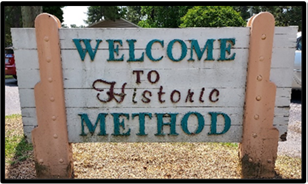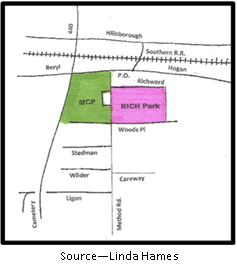This is a guest post from WCGS member and recording secretary, Linda Hames. This post originaly was published in the Wake Genealogy Watch newsletter, v5.4, Summer 2022.
“The history of Method became a fascination for me in May, 2019, and I still have a long list of places and events yet to be explored.” - Linda Hames
Historic Method Community and Oak Grove Cemetery - Then and Now
In 1865, virtually all of what is now Wake County was made up of farms or plantations, depending on the definitions used. Before the war, in 1860, North Carolina had 331,159 persons who were “owned” by other persons. Most of them were farm workers. In 1865, they were freed, and they soon began to form Freeman’s Villages.
Those who could afford to do so, moved into the city where the population grew rapidly. In the Raleigh 1870 census, out of a population of 7,790, there were 4,094 Blacks (53%).
Maps and other records show us the location of at least 13 new Black communities that formed within what is now the City of Raleigh. Most of those areas are no longer recognizable because of development and urban renewal projects. One exception is Oberlin, but the landscape there is changing as multi-story buildings are rapidly replacing historical homes. A second exception is Method, where there has been only a small amount of modernization, and many descendants of the original settlers still live there. The map below shows what Method looked like in 1865 – a few gravel roads and the Southern Railroad.
Historic Method Community
Confederate General and plantation owner, William Ruffin Cox, sold 69 acres (1872) to Jesse Mason and Isaac O’Kelly who parceled it into small lots allowing many newly freed Black families to build their own slab houses (one-room log houses with a dirt floor.) As it grew, the name became Mason Village, and finally named “Method” as one of the stops on the railroad.
This map shows what the area looks like today, positioned nicely between Raulston Arboretum and Neomonde restaurant.
Berry O’Kelly
Berry O’Kelly was extremely important to the success of the Method community. Born in Chapel Hill about 1864, he arrived in Method as a teen. He worked at the General Store and by age 28 owned the store. It became the Method post office, and he was Postmaster for 25 years.
The photo below shows Berry O’Kelly in front of the store/post office (ca. 1930) . The new Method post office operates at that same location today, but the train no longer makes a stop there.
Berry O’Kelly expanded the store to offer meat, fish, shoes, and clothing. He also operated businesses on East Hargett St. known as Black Mainstreet. He became wealthy and was a prominent person in Wake County and state-wide.
The Berry O’Kelly School
In the post-Civil War South, enslaved persons were free, but the rule of the land was Jim Crow and “separate but equal.” Blacks were not allowed to attend white schools. Realizing that injustice, Berry O’Kelly donated land (1894) for a black school in Method. In the beginning, it was a boarding school with students from Apex, Fuquay, and Zebulon. In 1920, the school became the first fully accredited black high school in the state of NC. It served as a model for other schools. Graduates interned at Shaw University and became teachers throughout the state.
This main building had 11 classrooms, a library, and an auditorium. The Berry O’Kelly school was one of the thousands that was partially financed by the Jewish philanthropist Julius Rosenwald.
Integration became the law in 1954 – Brown v. Board of Education. William Campbell (1960) was the first to integrate an all-white school in Raleigh (Murphy School.) Six sophomore girls from Berry O’Kelly High School were forced to integrate Cary High School in 1963.
Raleigh annexed Method in 1960, and also took control of the Berry O’Kelly school. It was closed in 1966. All buildings were demolished except for the Agriculture Building and the gymnasium.
Historical designations have been awarded to the Berry O’Kelly Historical District, which is 8.4 acres and the Oak Grove Cemetery.
Oak Grove Cemetery
Oak Grove Cemetery was established about 1870 soon after the Method community formed. In 2016, a grant paid for a ground-penetrating radar survey which identified 403 graves, 152 with markers. The cemetery is still being used today.
THE BATTLES – Method residents were forced to negotiate with the City, the County and the DOT in order to survive.
The original plan for 440 would have passed through the middle of Method, but it was eventually moved slightly to the west. Twice since then, parts of Method have been lost due to the widening of 440.
At present (2022) the tunnel from Method to the Oak Grove Cemetery is blocked while a bridge is being built for Ligon St. to pass over 440. The designation as a Historic Place saved the cemetery from being devastated.
FIND OUT MORE
Wiki article about William Ruffin Cox—The Confederate General who sold the acreage.
Culture Town: Life in Raleigh's African American Communities, by Linda Simmons-Henry and Linda Harris Edmisten is available in the closed stack of Olivia Raney Library or on Amazon.
Method Boys to Men Fellowship - Website for the group of volunteers who work toward the welfare of Method residents. website
Oak Grove History and Burials by Ruth Little includes the history and a list of stones and inscriptions.
“Beltline construction disturbs historic cemetery,” News & Observer May 18, 2021
Walter Magazine - March 2021, “A Legacy of Generosity: The History of Method”
Take Linda's self-guided tour of Method, RICH Park and Oak Grove:
A Self-guided Tour of RICH Park and Method, NC – By Linda Hames, May 2022
Drive to the Method Post Office 3919 Beryl Rd.
This was a country store in 1873, and became a P.O. about 1890.
Continue west on Beryl Rd; Take the first left onto Method Road.
Take the first left onto Richward Place to a parking area; From the drive you will see many 1 and 2-story brick buildings on your right. There are 100 apartments.
THIS IS RICH PARK! (“RICH” stands for Raleigh Inter Church Housing. In 1967, 5 churches created a corporation, secured a HUD loan, and built this 100-units of affordable housing. It still thrives today.
Take Richward Place to leave and cross Method Road.
Enter Method Community Park.
It is a part of Raleigh Parks and Recreation Park your car and take a walk to find:
Plaques on the office building designate Raleigh Historical Landmark and National Registry of Historical Places. Main building contains the original gymnasium.
An old brick building called the Agriculture Building – 1926 – is the only building that remains from the Berry O’Kelly School near the picnic shelter.
St. James African Methodist Episcopalian Church; Raleigh Historical Landmark; Founded 1866.
Berry O’Kelly donated the land for the St. James A.M.E. church on Method Road. Burial place of Berry O’Kelly; Died March 14, 1931. - near the church
Across the street - Offices of RICH Park.
TO THE CEMETERY
Until very recently, you could drive west on Ligon St. and come to a one-way tunnel, and then see the cemetery on your left. The very quaint tunnel is now blocked off and you will now need to take this longer route….
From Blue Ridge Road, drive east on Hutton until you reach Ligon Street.
From Ligon, you will see the Oak Grove Cemetery on your right. Now (May 2022) you can see the blocked off tunnel and you can see the beginnings of a new BIG bridge that will carry Ligon St. over 440.
Oak Grove is on the National Registry of Historic Places.
It needs lots of work.
A grant provided for a ground-penetrating radar (GPR) in 2016.
The survey identified approximately 403 graves, 152 with markers.
THE METHOD COMMUNITY
Slaves freed from nearby plantations began to form this community in 1865.
Linda’s passion and research has made it possible to include a good record of Oak Grove Cemetery in the Wake County Cemetery Survey project where none existed. The cemetery had been neither reported or surveyed at the time of the original project. Linda’s work allows us to provide history, names and inscriptions and add this cemetery to the permanent record of Raleigh despite its vulnerability to progress. Thank you Linda! - CD
Visit the Wake County Genealogical Society - Homepage | WCGS Events | Join WCGS | Publications | Digital Resources | History Resources | More Links and Resources | Contact













